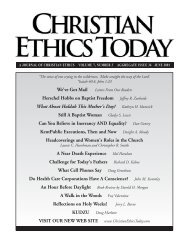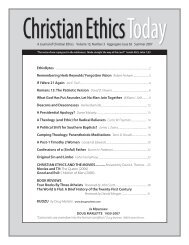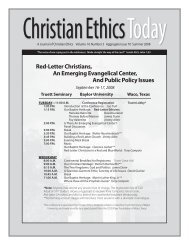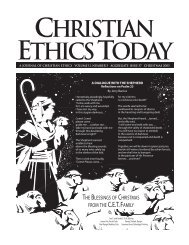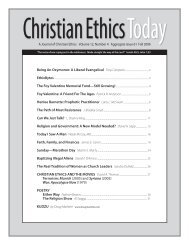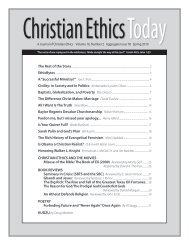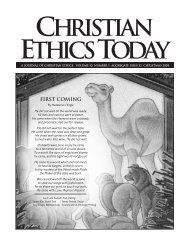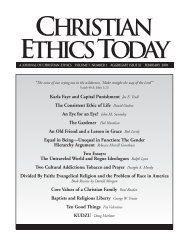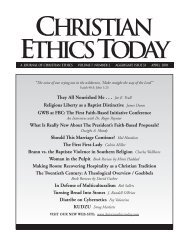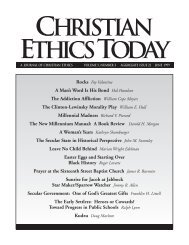Issue 048 PDF Version - Christian Ethics Today
Issue 048 PDF Version - Christian Ethics Today
Issue 048 PDF Version - Christian Ethics Today
Create successful ePaper yourself
Turn your PDF publications into a flip-book with our unique Google optimized e-Paper software.
No one likes to say, “I told you so.” But if it were not so<br />
sad, I would. Or maybe I just did!<br />
First, Louisiana College (Baptist) president Rory Lee<br />
ordered two books removed from the college bookstore—<br />
Scott Peck’s A Road Less Traveled and A Lesson Before Dying by<br />
Ernest Gaines. Evidently some students found “objectionable<br />
materials” in the books (reportedly curse words and a sex<br />
scene), used as supplemental reading in a values course. I’ve<br />
not read Gaines’ book, but half the preachers I know have<br />
read and quoted Scott Peck in their sermons. What’s next?<br />
Chaucer ? Hemingway ? Certain parts of the Bible?<br />
This event led the LC trustees on last December 2 to<br />
establish a policy change, requiring approval of all textbooks<br />
and supplemental reading by department chairs and the vice<br />
president of academic affairs. Although the President and<br />
Trustees are putting the best “political spin” possible (an election<br />
year helps) saying they were trying to provide “accountability,”<br />
the truth came out in the fine print.<br />
Trustee Fred Malone said the new policy “falls in line<br />
with the 2000 Baptist Faith and Message.” When asked to<br />
quote chapter and verse, officials noted the statement in the<br />
BF&M called for “proper balance between academic freedom<br />
and responsibility.” It then states the freedom of a<br />
<strong>Christian</strong> teacher is limited by “the preeminence of Jesus<br />
Christ, the authoritative nature of Scriptures, and by the distinct<br />
purpose for which the school exists.” Duh! When you<br />
use a creed as a club, you don’t need to make it sensible.<br />
There it is. I told you . . . no, I’m not going to say it.<br />
In almost all institutions of higher education (as was true<br />
at LC), each professor is responsible for developing course<br />
content, selecting textbooks and reading material, and determining<br />
other requirements. As professional educators, their<br />
training and research prepared them for that. And, they are<br />
responsible. Academic freedom meant administrators and<br />
trustees should not interfere and control the teaching<br />
process. Why? Because their limited knowledge of the subjects<br />
taught and their political bias would inevitably lead<br />
them to ban any books or teaching that was contrary to their<br />
own likes and dislikes.<br />
Editor: Joe E. Trull<br />
Publisher: <strong>Christian</strong> <strong>Ethics</strong> <strong>Today</strong> Foundation, 101 Mt. View Rd.; Wimberley, TX 78676. (512) 847-8721; FAX (512) 847-8171.<br />
CHRISTIAN ETHICS TODAY is produced in the U.S.A. and is published bi-monthly, mailed from Dallas, Texas, where third-class postage is paid. Articles published in CET<br />
express the views of the authors and not necessarily the viewpoint of the Journal or the Editor.<br />
Send corrections and change of addresses to P.O. Box 26, Wimberley, Texas, 78676.<br />
2 • FEBRUARY 2004 • CHRISTIAN ETHICS TODAY<br />
I Told You So . . .<br />
By Joe E. Trull, Editor<br />
The faculty at LC, by a vote of 48-8 responded: “We<br />
regret and disagree with the recent effort by the board of<br />
trustees to establish a policy of censorship of the LC faculty.<br />
Such a practice violates the current college policy of academic<br />
freedom, limits the education of students, damages the<br />
reputation of the institution, hinders recruitment efforts, . . .<br />
inhibits the ability of the college to function, demeans the<br />
faculty, students, and the administration, and is inconsistent<br />
with the American tradition of higher education.”<br />
The Religious Right has inordinate influence over most<br />
conservative churches in Louisiana. It has manipulated the<br />
majority of Southern Baptists into believing that the only<br />
way to restore conservative values is through coercion,<br />
manipulation, and control. Thus, a document is created<br />
which can force conformity to “traditional values,” thus<br />
restoring an idyllic age of the past which really never existed.<br />
Editor To Visit Campuses and Communities<br />
During 2004 and 2005, the editor is planning to visit colleges,<br />
seminaries, and communities to promote the Journal.<br />
At the schools he will speak to classes and chapel services on<br />
<strong>Christian</strong> ethics subjects such as ministerial ethics, clergy sexual<br />
abuse, the gender debate among Baptists, etc. He will also<br />
distribute <strong>Christian</strong> <strong>Ethics</strong> <strong>Today</strong> to students and professors in<br />
order to increase readership of the Journal.<br />
The visit will include discussion about the Revised and<br />
Expanded 2 nd Edition of Ministerial <strong>Ethics</strong>: Moral Formation<br />
for Church Leaders, published this month by Baker Academic<br />
of Grand Rapids, Michigan. Co-authored by the editor and<br />
James E. Carter, the book has become a standard text in the<br />
field.<br />
The editor also hopes in these communities to meet with<br />
pastors and lay leaders who are supporters of the Journal.<br />
One goal of our Journal is to enlist 40-50 churches who will<br />
give $500-$1000 annually to the budget of <strong>Christian</strong> <strong>Ethics</strong><br />
<strong>Today</strong>, which would underwrite one-half of our present budget<br />
of $65,000. Your prayer support for this endeavor is<br />
requested and appreciated. ■



